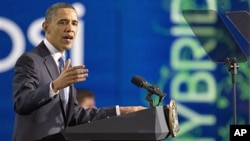Republicans and Democrats have been locked in a fierce battle over government spending priorities for months, with some fiscally conservative "Tea Party" Republicans pushing for $60 billion or more to be cut from the current federal budget. They have passed short-term resolutions several times to keep the U.S. government from shutting down. Now, as another shutdown deadline approaches, congressional aides are reportedly negotiating cuts in the range of $30 billion - an amount some Republicans had originally asked for at the start of the process.
Speaking in Maryland, President Obama said there are still "details and differences" to be worked out, but said compromise is within reach.
He spoke just hours after the government reported the national unemployment rate has dropped to 8.8 percent, the lowest rate in two years. Mr. Obama cautioned that a government shutdown could reverse the positive trend.
"If these budget negotiations break down, we could end up having to shut down the government just at a time when the economy is starting to recover," said Obama. "That could jeopardize the economic recovery, it has an impact on everybody's bottom line."
Watch a related report by Jeff Swicord
A government shutdown would mean that millions of government employees deemed non-essential would not report to work and would not get paid until the budget showdown is resolved. National security would not be affected, but national parks would close and visa and passport services would likely be suspended.
Speaker Boehner said a compromise agreement on the budget has not been reached yet, but said negotiations are still going on.
"We are continuing to talk, but it is time for the Senate to get serious," Boehner said. "Senate Democrats need to get serious about cutting spending, because cutting spending will lead to a better environment for job creators."
The Republican-controlled House has passed a budget with some $60 billion in cuts, but it failed to pass in the Democratic-controlled Senate. A number of Tea Party Republicans are rejecting any compromise on spending cuts, putting Speaker Boehner in a difficult position. He made it clear Friday that he does not want a shutdown.
"Frankly let's all be honest. If you shut the government down, it will end up costing more than you save," said Boenher. "Because you interrupt contracts, there are a lot of problems with the idea of shutting the government down. It is not the goal."
Asked what he is doing to prepare his own congressional office for a shutdown, Boehner said, "I am not preparing for a government shutdown."
Next week promises to be full of suspense, as both the House and the Senate have to pass identical versions of a 2011 budget or short-term spending bill to prevent the U.S. government from shutting down after Friday. If the lawmakers manage to do that, they can finally turn their attention to the 2012 federal budget that President Obama has proposed.





